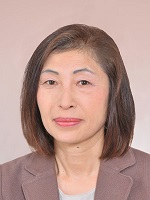
Prof. Atsuko K. Yamazaki, Digital Hollywood University, Japan
Profile: Atsuko K. Yamazaki is Professor at Shibaura Institute of Technology, where she teaches communication studies and conducts research in the areas of information science, systems engineering, human communication studies and global education in engineering. She holds the following degrees: BS in Chemistry, Ibaraki University; MA in TESOL, Monterey Institute of International Studies; MS in Computer Science, University of Maryland; and Ph.D. in Systems Engineering, Wakayama University. She has held leadership positions in the IEEE Professional Communication Society and the Japan Association of College English Teachers. She was an adjunct research instructor at the Naval Postgraduate School in Monterey, California and a visiting researcher at The Woods Hole Oceanographic Institution. She joined the Institute of Technologists as an Associate Professor in 2001 and moved to Shibaura Institute of Technology in 2008. Her work has been published by Ecological Modelling, Deep-Sea Research, IEEE, KES, Japan Society for Artificial Intelligence, Japanese Society for Information and Systems in Education, and others. Her current research projects include studies of user-interface designs to enhance brain activity in the elderly, and human cognitive activities for human-system communication from neurological aspects. She has also been leading projects for developing ICT & IoT systems to assist small and medium farming operations. She has been serving as Chair for an Invited Session: Human Factors for Communication & Intelligent Systems, at KES conferences since 2014.
Prof. Thomas Kang, Seoul National University, South Korea
Profile: Dr. Kang is a Professor in the Department of Architecture & Architectural Engineering and Director for Engineering Education Innovation Center at Seoul National University, Korea. Prior to that, he was an Assistant Professor in the School of Civil Engineering and Environmental Science at the University of Oklahoma, Norman, OK, USA. He has held various affiliated positions in the U.S. and Japan, including Adjunct Professor at the University of Oklahoma, Adjunct Professor at the University of Illinois at Urbana-Champaign, and Lecturer at UCLA, the University of Hawaii at Manoa and the University of Tokyo. Prof. Kang received his PhD from UCLA, his MS from Michigan State University, and his BS from Seoul National University.
Prof. Kang is a Fellow of Post-Tensioning Institute (PTI) and a Fellow of American Concrete Institute (ACI). Prof. Kang received the Kenneth B. Bondy Award for Most Meritorious Technical Paper as Lead Author from PTI in 2012, and the Wason Medal for Most Meritorious Paper as Lead Author from ACI in 2009 with the subject of post-tensioned concrete. He regularly teaches the course of Post-Tensioned Concrete Structures at the University of Illinois at Urbana-Champaign every other summer (both on campus and online) and at the University of Hawaii at Manoa every fall (live online lectures). Prof. Kang is an Editor-in-Chief for three journals: International Journal of Concrete Structures and Materials, Journal of Structural Integrity and Maintenance, and Advances in Computational Design; and Associate Editor for PTI Journal of Post-Tensioning Institute. He is one of the founding and voting members of PTI DC-20 Committee, Building Design, and has been a voting member for ACI Committee 369, Seismic Repair and Rehabilitation; Joint ACI-ASCE Committees 335, Composite and Hybrid Structures, 352 Joints and Connections in Monolithic Concrete Structures, and Joint ACI-ASCE Committee 423, Prestressed Concrete; and Joint ACI-ASME Committee 359, Concrete Containments for Nuclear Reactors, as well as various committees in Korea.
Prof. Kang published more than a hundred international journal papers and more than a hundred international conference proceedings, including 40 in ACI Structural Journal and 10 in PTI Journal. He has chaired many sessions/symposiums of structural engineering; delivered many keynote/invited speeches; and organized international conferences/workshops as a Chair. Additionally, Dr. Kang has done a lot of practice as a consulting engineer in Korea and the U.S. Prior to joining the academia, he had a working experience in California, USA (e.g., John A. Martin & Associates), and was a licensed Professor Engineer (PE) in California.